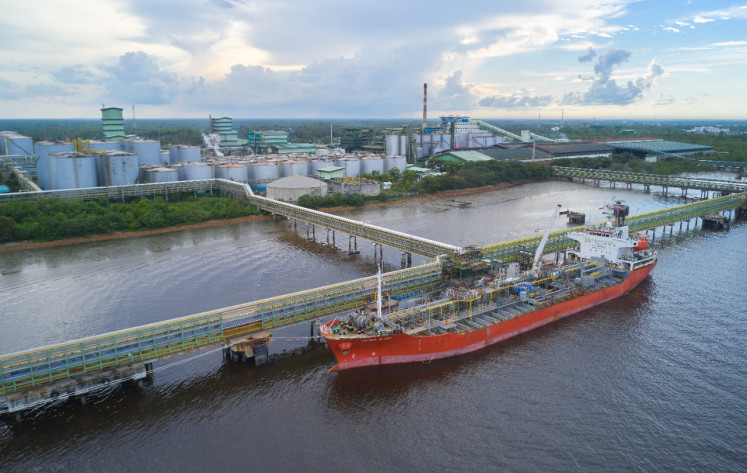Popular Reads
Top Results
Can't find what you're looking for?
View all search resultsPopular Reads
Top Results
Can't find what you're looking for?
View all search resultsMitigating climate change through sustainable financing
Change text size
Gift Premium Articles
to Anyone
T
he government is promoting the green economy as one of the key strategies to mitigate the impact of climate change. At the heart of this strategy is the critical role of the Financial Services Authority (OJK).
The OJK is preparing its guidance for climate-change risk management, which will require financial service companies to have internal guidelines and a business plan for the implementation of sustainable finance policies.
The guidance is part of the Roadmap for Sustainable Finance Phase II (2021-2025) that the OJK has drawn up in a bid to accelerate the growth of a green economy through sustainable finance initiatives.
The guidance is expected to serve as a basis for supervising the banking and financial services sector on sustainable finance, said OJK Board of Commissioners head Wimboh Santoso in at the Katadata SAFE Forum 2021 in Jakarta recently.
Wimboh warned of the high price Indonesians face if sustainable finance initiatives are not taken seriously.
More frequent and extreme floods and droughts are among the potential climate disasters that confront Indonesia.
“Therefore, it’s better to be ready rather than leave the next generation to bear the high price and consequences”, he added.
The OJK collaborates closely with international agencies such as World Bank, the IMF and the Organisation for Economic Co-operation and Development (OECD).
The concept of sustainable finance, introduced when the United Nations established the 2030 Sustainable Development Goals (SDGs), has shone an international spotlight on the significant role that the financial sector plays in championing sustainability.
Sustainable finance refers to any form of financial services that integrate environmental, social and governance (ESG) criteria into business and investment decisions for the long-term benefit of clients and society.
It embraces the notion that financial institutions consider care of the planet and people and not focus solely on maximizing profit.
Wimboh said on another occasion that the COVID-19 pandemic should serve as a catalyst for change.
According to him, commitment to, and implementation of, sustainable finance requires a mind-set change; that environmental and social risks provide opportunities for financial innovation.
In addition to the Roadmap for Sustainable Finance in Indonesia Phases I and II, the OJK has issued regulations that support the growth of sustainable finance. They include POJK No.51/POJK.03/2017 relating to the implementation of sustainable finance for financial service institutions, publicly listed companies, and public companies, as well as POJK No.60/POJK.04/2017, which sets out the standards for green bond issuance in the country.
Several banks and financial institutions have responded to the regulations by implementing sustainable finance practices such as channeling funds for green and inclusive projects, issuing green bonds, boosting their SRI-Kehati Index rating, and issuing the ESG Leaders Index on the Indonesia Stock Exchange.
Sustainable finance also helps the financial institutions integrate climate goals and long-term risks into their portfolio management.
The OJK is optimistic that through robust policies and regulations, as well as commitment from all stakeholders, sustainable finance in Indonesia can help the country achieve the global goals set out in the Paris Agreement and the UN SDGs.
When it comes to developing a green economy through sustainable financing, private-sector engagement is critical given the specific expertise it has around technology, efficiency, funding and entrepreneurship.
Apical Group, a leading agri-business processor of palm oil and member of the RGE group of companies, is one example.
The company has secured a US$750 million sustainability-linked loan from a syndicate of lenders. This is a first for Apical, and among only a few known in the palm oil industry, where borrowing is tied to sustainability targets and performance.
The loan, issued to Apical’s units AAA Oils & Fats Pte Ltd and Apical Middle East, is structured as two-year revolving credit and four-year term loan facilities.
Under the facilities, Apical is committed to meeting improvement targets for a range of ESG metrics, as assessed by Environmental Resources Management, a London-headquartered global provider of environmental, health, safety, risk and social issues consulting services.
Andy Cairns, head of global corporate finance at First Abu Dhabi Bank, the facility agent, commented, “We congratulate Apical on this achievement. ESG is an increasing focus for borrowers and investors globally and it reflects very highly on Apical that it is among the first Asia names, and companies in its industry sector, to embrace this. I am confident that such forward-thinking commitment to achieving its sustainability goals will position Apical advantageously for the future.”
The targets are based on Apical’s commitment to ensuring a sustainable supply chain. Performance against the pre-determined targets will be assessed on an annual basis for the loan period, and incentives awarded accordingly. The loan will be used to finance working capital and capital-expenditure requirements of Apical Group.
Apical’s executive director, Pratheepan Karunagaran, said, “This is a milestone for Apical and a testament to the commitment and confidence we have in our ESG performance. The spirit of continuous improvement is deeply rooted in our corporate culture and we are motivated to perform even better to deliver against the loan targets set. We are grateful for the enthusiasm of our financiers and hope that our success will serve as a catalyst in further developing sustainability-linked financing in the sector.”
The loan facilities were met with overwhelming demand with participation from 22 banks in nine countries. Among the mandate lead arrangers and book runners are E.Sun Commercial Bank, Ltd, First Abu Dhabi Bank, Mega International Commercial Bank Co., Ltd, MUFG Bank, Ltd, Bank Sinopac and Taishin International Bank Co., Ltd.












